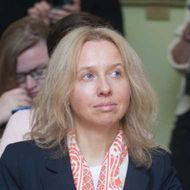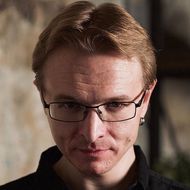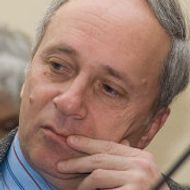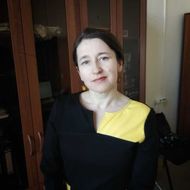- A
- A
- A
- ABC
- ABC
- ABC
- А
- А
- А
- А
- А
- HSE University
- Faculties
- Faculty of Humanities
- School of History
- News
- “Understanding Economic Growth and Development in Central and Eastern Europe”: Workshop in Economic History and Development
105066 Moscow, Staraya Basmannaya 21/4, building 3
Phone: +7 (495) 772 95 90 *22858
The HSE School of History was established in 2015 on the basis of the HSE faculty of history. The School's staff brings together leading scientists in various fields of historical knowledge who are widely known and respected in Russia and the international academic community. The School’s instructors are leading historians are authors of numerous books and articles, regular participants in major international scientific forums and research projects, and are also known as popularizers of historical knowledge. The HSE School of History actively cooperates with leading foreign universities and research centers, and organizes international scientific conferences, symposia, and colloquiums.
 Russian Faith, Honour, & Courage Displayed in a Faithfull Narrative of the Russian Expedition by Sea (1769 & 1770)
Russian Faith, Honour, & Courage Displayed in a Faithfull Narrative of the Russian Expedition by Sea (1769 & 1770)
Leikin J., Elena Smilianskaia.
NY: Boydell and Brewer Ltd, 2024.
In press
Vinogradov A., Korobov M.
Indogermanischen Forschungen. 2025. Vol. 130. No. 1. P. 7-28.
Sergey V. Kostelyanets.
In bk.: BRICS and Climate Change: Balancing National Interests, National Development Goals and Global Environmental Sustainability. Singapore: Springer, 2024. Ch. 3. P. 67-96.
Kolesnik A., Rusanov A.
Working Papers of Humanities. WP. Издательский дом НИУ ВШЭ, 2021. No. 205.
105066 Moscow, Staraya Basmannaya 21/4, building 3
Phone: +7 (495) 772 95 90 *22858

“Understanding Economic Growth and Development in Central and Eastern Europe”: Workshop in Economic History and Development
National Research University Higher School of Economics (HSE), Moscow, 2-3 September 2016.
Keynote Speakers: Tracy K. Dennison (California Institute of Technology), Leandro Prados de la Escosura (Carlos III University in Madrid).
Proposals for papers accepted until March 31, 2016.
Central and East European countries (CEEs) had the planned economy past characterized by an inefficient economic structure. It is widely recognized that these adverse conditions discouraged economic growth in the region and made these economies less prosperous in comparison with the West. At present, after two decades of transition, the command economy rudiments are mostly eliminated. However, there are still significant differences in the levels of GDP per capita between CEEs. For example, Slovenia is successfully ‘catching-up’ economically with its Western neighbors, while Moldova continuous to lag behind. This suggests that the historical roots of the East-West dissimilarity go far beyond the planned economy period.
The WEast initiative facilitates research in the centuries-long economic history of the region. It is bringing together young researchers and senior leading experts in the field, both from Eastern and Western institutions. The upcoming Moscow seminar is the sixth in a row of similar seminars that begun in 2011 and so far took place in Groningen, Warsaw, Belgrade, Budapest, and Prague (forthcoming in July 2016).
The Moscow seminar will be hosted by the Faculty of Economic Sciences and the School of History at Higher School of Economics. We invite both established researchers and graduate students to submit their papers considering various aspects of economic history of the region. We welcome both submissions concerning general economic issues and those that deal with less widely known aspects of Central and Eastern European development.
Those wishing to participate should send their research paper and/or extended abstract along with short academic CV by email to Ilya Voskoboynikov (ivoskoboynikov@hse.ru) no later than March 31, 2016. Selected participants will be informed before April 15. Selected participants are expected to send full versions of the papers before August 1. All documents in the application package should be in English.
We provide assistance with visas and accommodation. Travel and accommodation costs are expected to be covered by participants. However, for graduate students and those who got Ph.D. in five recent years travel and accommodation costs may be covered. Working language of the seminar is English. More information about the WEast initiative can be found at weast.info.
Local organizers
Elena Korchmina
Ilya Voskoboynikov
WEast organizers
Mikołaj Malinowski
Tamás Vonyó
Jacob Weisdorf
Elena S. Korchmina
- About
- About
- Key Figures & Facts
- Sustainability at HSE University
- Faculties & Departments
- International Partnerships
- Faculty & Staff
- HSE Buildings
- Public Enquiries
- Studies
- Admissions
- Programme Catalogue
- Undergraduate
- Graduate
- Exchange Programmes
- Summer Schools
- Semester in Moscow
- Business Internship
-
https://elearning.hse.ru/en/mooc/
Massive Open Online Courses
-
https://www.hse.ru/en/visual/
HSE Site for the Visually Impaired
-
http://5top100.com/
Russian Academic Excellence Project 5-100
- © HSE University 1993–2025 Contacts Copyright Privacy Policy Site Map
- Edit




.png)
.jpg)
.png)